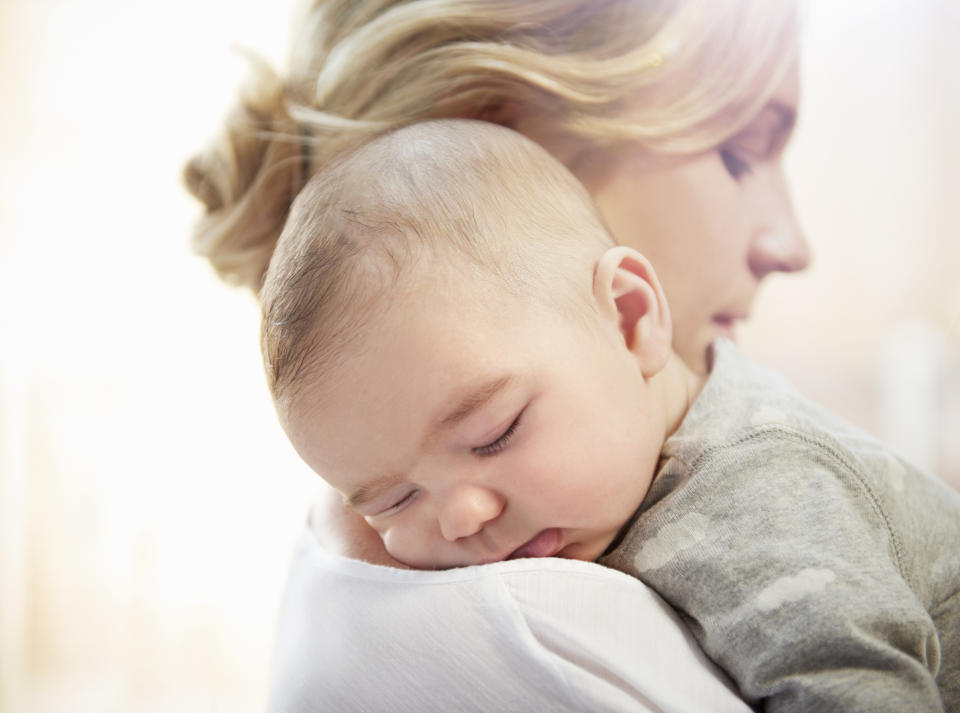A baby sleep routine in first 12 weeks is 'pointless', says expert
Sleep - or lack thereof - is a very common topic when it comes to parenting.
Simply put, babies and toddlers don’t sleep like us. There’s science behind the way they sleep compared to adults and the term “body clock”, which many of us will be familiar with, is not something babies possess in the first 12 weeks.
“We all sleep in cycles, nobody sleeps all night,” parenting author and sleep expert, Sarah Ockwell-Smith, explains, “for adults, we go through cycles every 90-120 minutes.”
According to Ockwell-Smith, we go into a light sleep (which is when you’re most likely to jolt awake because you fell over in your dream), from there your sleep gets deeper and deeper until about half way through the cycle.
Babies don’t follow the same cycle, and understanding that is the first step to helping your baby sleep well.
Read more: Pregnancy experts share top tips for getting through lockdown
“Half way through your cycle it’s almost like you (adults) are in a coma. Your body is completely still and paralysed. It’s quite scary but we all go through it.
“Then you come out to a lighter level of sleep after one and a half to two hours and that cycle of sleep is finished,” Ockwell-Smith explains on Yahoo UK’s pregnancy series, The Baby Bump with Lauren Pope.
When a cycle finishes, you may just launch straight back into another cycle or - if you’re pregnant, for example - you may need to get up to go to the toilet.

There are plenty of other reasons our sleep cycles might be disrupted, though. Perhaps we’re too hot, too cold or our pillow has fallen off the bed. Unlike babies, we can adjust our surroundings and “self-soothe” and in most cases drift back off to sleep.
Read more: Meet the artist who has painted over 350 baby bumps
Sleep cycles for babies last around 40 minutes and toddlers last around 60 minutes.
An adult will have roughly four-five sleep cycles a night and a baby will have 15-16 sleep cycles. That’s quite a difference.
That means that there are around 15 opportunities per night for your baby to transition from one sleep cycle to the next. That’s 15 opportunities for them to realise they’re not quite comfortable and fully wake up.
Unlike adults, babies and toddlers can’t self-soothe if there’s something bothering them.
“If they wake up and they’ve got a tummy ache, or it’s too bright or too dark, or they’re thirsty or they’ve got a sore throat or they had a bad dream or they’re uncomfortable, they can’t do anything about it,” Ockwell-Smith tells Lauren Pope.
Read more: Pregnant Lauren Pope shares pressure to bounce back after birth
Another important thing to note is that a baby’s body clock doesn’t kick in until week 12 of their lives.
In a mum’s tummy, babies are told via our hormones when it’s night and day and that circadian rhythm takes a while to kick in when the baby is born.
So if you’re thinking of getting your baby into a routine within the first three months of their lives, you might want to think again because until they can tell the difference between night and day, you might be fighting a losing battle.
We hear you, three months is a long time to lack any kind of sleep routine, but there are ways to help during the transition period.
“I would focus on making the environment as sleep friendly as possible.
“Start introducing sleep cues, a cue is just something that tells your baby what’s coming next. It could be that at 6 o’clock at night you always give them a bath and then after a bath they have a feed. Then they start to learn bath time, feed time, bed time.
“Don’t be strung up on strict routines, biologically it’s pointless until 12 weeks anyway.”




